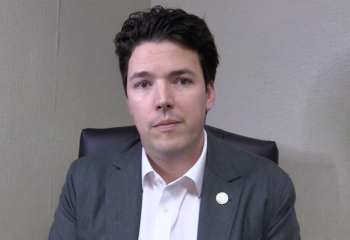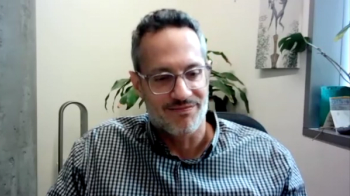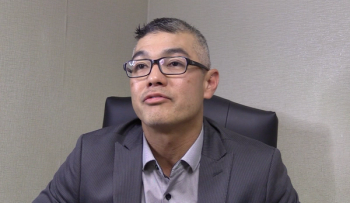
The symptoms of dry eye are multifactorial, says Mina Massaro-Giordano, MD, making identifying and treating dry eye important for quality of life.

The symptoms of dry eye are multifactorial, says Mina Massaro-Giordano, MD, making identifying and treating dry eye important for quality of life.

In part 2, Hans Lee, MD, shares practical tips for using linvoseltamab in heavily pretreated multiple myeloma and outlines trials that may expand its future role.

Caroline Vovan, PharmD, CDE, highlights how ambulatory clinical pharmacists contribute to value-based care by managing chronic conditions, improving medication adherence, and reducing costs.

Sanjay Doddamani, MD, MBA, a former senior advisor to the Center for Medicare and Medicaid Innovation, and internist and cardiologist by training, explains how the Wasteful and Inappropriate Service Reduction (WISeR) Model hopes to work, and addresses concerns about delays and denials from revamped prior authorization processes.

Tabby Khan, MD, MPH, senior director of Analytics at Komodo Health, calls for increased lung cancer screening measures and criteria to address underreported, at-risk populations like AAPI women.

Imetelstat (Rytelo; Geron) significantly improved and sustained health-related quality of life in patients with lower-risk myelodysplastic syndromes (MDS), with benefits linked directly to the drug rather than patient characteristics.

Because patients do not always associate their symptoms with dry eye, they often turn to treatments that do not work, says Nicole Bajic, MD.

The newly approved linvoseltamab (Lynozyfic; Regeneron) has a manageable safety profile, along with a patient-friendly dosing schedule that includes intravenous administration, step-up dosing, and de-escalation to monthly maintenance.

The phase 3 IMerge trial (NCT02598661) evaluated how treatment with imetelstat impacts health-related quality of life in patients with lower-risk myelodysplastic syndromes (MDS), according to María Díez Campelo, MD, PhD.

Multiple medications and treatments can be used to address dry eye and dry eye disease in patients, says Karen Fernandez, MD.

Risk factors can vary for dry eye, a condition that affects the layers of tear film on the eye, says Nicole Bajic, MD.

Robert Kratzke, MD, urged insurance providers to prioritize fast biomarker testing in non–small cell lung cancer, saying it’s both cost-effective and life-saving.

The aim of the study was to not only observe the disparities exacerbated by the COVID-19 pandemic but also to draw attention to the issue to drive real, lasting change.

The recent decision in Kennedy v Braidwood could give Robert F. Kennedy Jr, secretary of HHS, the ability to remove all members of the US Preventive Services Task Force (USPSTF) if desired, according to Jeffrey Fitzgerald, JD.

Mirima Freimer, MD, delves into potential reasons behind the longer-term efficacy of zilucoplan and also speaks to the treatment’s safety profile.

The decision could have ripple effects across the country when it comes to state governments deciding who gets to receive Medicaid funds, says Jennifer Evans, JD.

Avoiding downstream testing ultimately makes it cheaper for whoever is footing the bill, says Merrill H. Stewart, MD, Ochsner Health.

Carrie Kitko, MD, explains that axatilimab maintains strong response rates in patients with chronic graft-versus-host disease (GVHD) regardless of previous treatment lines and emphasizes the need to explore combination therapies.

Nipocalimab's FDA approval revolutionizes generalized myasthenia gravis treatment, offering rapid symptom relief and improved patient outcomes across diverse populations.

The Braidwood decision maintains the status quo for many patients, keeping preventive services covered by Medicaid under the Affordable Care Act (ACA), says Jeff Fitzgerald, JD.

The post hoc analysis of the AGAVE-201 trial found that axatilimab demonstrated consistent response rates in patients with chronic graft-vs-host disease (GVHD), regardless of the number or type of prior therapies.

In a webinar, panelists discuss Trump's 2025 drug pricing policies, focusing on the Most Favored Nation order, pharmacy benefit manager reform, and implications for manufacturers and patients.

The Supreme Court decision in Medina v Planned Parenthood interprets the Social Security Acts Medicaid provision as not being able to be enforced by an individual, according to Jennifer Evans, JD.

Explore how the Collaborative Care Model enhances mental health access in this episode featuring Anna Bobb, MPH, executive director of the Path Forward coalition.

Merrill Stewart, MD, Ochsner Health, says insufficient funding from CMS for graduate medical education (GME) limits the ability to expand cardiology fellowships and contributes to the nationwide physician shortage.

Nicolas Ferreyros, managing director, Community Oncology Alliance, discusses key components of health equity and social determinants of health that need to be addressed in cancer care.

AZD0486 demonstrated encouraging safety and dose-dependent efficacy in heavily pretreated adolescent and adult patients with relapsed/refractory B-cell acute lymphoblastic leukemia (ALL), according to early findings from the phase 1/2 SYRUS trial and Ibrahim Aldoss, MD, of City of Hope.

Jody Agena, PharmD, MBA, director of pharmacy operations, Virginia Cancer Specialists, discusses the various responsibilities of the pharmacist within community oncology settings.

Rachel Rohaidy, MD, of Miami Neuroscience Institute and Baptist Health, discusses how the evolving treatment landscape is reducing stigma around relapse and why ongoing recovery requires daily commitment.

Financial, family, and logistical challenges often lead patients to choose ongoing therapies over stem cell transplantation, says Mansi Shah, MD.

259 Prospect Plains Rd, Bldg H
Cranbury, NJ 08512
© 2025 MJH Life Sciences®
All rights reserved.
